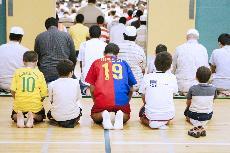This month, Muslims will spend their days doing something their classmates aren’t.
From dawn to sunset, they will be abstaining from food, drink, smoking — the list continues, but if it can be ingested, they won’t be taking part. That’s about 14 hours of fasting this month, but that time differs each year.
The tradition of Ramadan, which takes place during the ninth month of the lunar Islamic calendar, is a spiritual and physical “cleansing process,” according to Sara Haddad, president of the Muslim Students Association.
“It’s a whole different month,” Haddad, a sophomore in biochemistry, said. “It’s really to renew yourself inside.”
Who: Starting at puberty — when Muslim children are considered accountable for their actions — Muslims begin their month-long fasts. Before then, children pick the tradition up from their parents and siblings. For some, they won’t begin fasting until puberty. Others, like Haddad and Alavia Yahya, a junior in biological sciences, fasted for a few days at a time.
“It depends on your parents,” Haddad said. “When you grow up, you’re in that kind of environment.”
This environment, she said, makes it easy for children to mimic their families and fast — if only for a few hours or days at a time.
“Most kids do it without realizing it,” she said.
Yahya started the month-long fast at the age of 13. Before she hit puberty, she fasted with her family for a few days each Ramadan.
She was so unaccustomed to fasting for the entire month that she accidentally ate something during Ramadan.
“I forgot I was fasting,” Yahya said. “I felt so bad for several days.”
Those who are not physically capable of keeping fast for a month are exempt. This group includes, among others, those with medical problems, women who are pregnant and elderly men and women.
What: Haddad said the month-long observation, which has the namesake of the Islamic calendar’s ninth month, marks the time when the Qur’an was first revealed to Gabriel and, later, Muhammad.
“It was decreed in the Qur’an that we have a month of fasting,” Haddad said. “Ramadan has been followed since then. … It’s considered to be a very blessed and holy month.”
During the month, Muslims abstain from everything that can be ingested — from smoking to eating to drinking.
“It’s a hard task for the smoker,” Haddad said. “And in the summer, it’s a little hotter, so you get thirsty and you want to drink water. It takes a lot of self control.”
It’s even harder because “there is no one telling you that you have to fast,” Haddad said. “You’re doing this solely for the sake of God.”
During this time, Muslims also try to put life in perspective.
“Ramadan requires contemplation about life,” Haddad said. “It requires thinking about things in a different way.”
This means abstaining from empty speech — talking for no reason — and discussing “bad things,” Haddad said.
When: Ramadan started Sept. 1, and will continue until the end of the month. The month is the ninth month of the Islamic calendar, which follows the lunar calendar. According to Haddad, Ramadan occurs about 10 days earlier each year.
Where: Muslims spend the entire day fasting until sunset when families get together to have dinner together. Haddad said Ramadan is a unique month in that families eat most of their meals together.
“You’ve been fasting all day, and when you come home, you want to eat something,” Haddad said. “You get together to pray with family and friends.”
This makes Ramadan a month that heightens community ties, Yahya said.
“Different families will invite each other over, kind of like a dinner party. It’s a bigger deal to all be together and eat together,” Yahya said. “My mom makes special meals during Ramadan that she normally wouldn’t make because she’d be so busy during the year.”
At the end of Ramadan, Muslims get together to celebrate Eid Al-Fitr, the day after the last day of Ramadan. During this time, Muslims break fast as a community, getting together to pray, take part in festivities and give small presents, like candy, to kids. Eid Al-Fitr sometimes occurs at the State Fairgrounds.
Why: Yahya uses the month to reflect on what she’s done in the months prior to Ramadan, how she can improve and what she plans to do for the rest of the year.
“I try to be a better person, a better Muslim, overall,” she said.
Haddad said Ramadan’s practices urge Muslims to “give back to charity.”
“It’s to bring you back down to a certain level,” she said. “It brings you back to understanding what it’s like to not have food. You’re going back to basics.”








